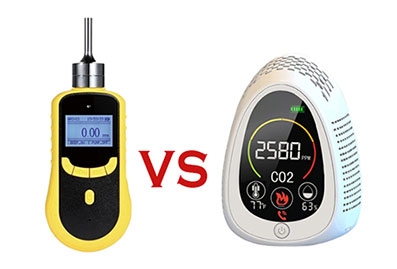Accidental gas leakage and smoke overflow can pose a great threat to our property, environment, and life, smoke detectors and gas detectors are more common in our life and bring a lot of convenience to our life, for maintaining our safety play a very good role in ensuring that we improve its process.
Understanding the difference between smoke detectors and gas detectors is very important for the correct selection of the desired detector, you can effectively understand the performance of the detector and improve the service life of the detector.
Principle of Operation
Smoke Detectors
Smoke detectors have the ability to detect fire signals at an early stage, and they generally work on the principle of preventing fires by detecting the concentration of smoke.
When the material combustion, often the first smoke, followed by visible and invisible light, and the material from the beginning of combustion to the fire gradually become bigger there is always a process, a sensitive smoke detector will "capture" the material combustion "signals", and put the smoke detector will "capture" the "signal" when the material is burning, and convert the "signal" into an electrical signal, which will be transmitted to the controller of the automatic fire alarm system.
Gas Detectors
Gas detectors measure and indicate the concentration of certain gases in the air by means of different technologies. They are manufactured as portable gas detectors or fixed gas detectors and indicate high gas concentrations through a series of audible or visible indicators such as alarms, lights, or signal combinations.
While many older standard gas detector units were originally manufactured to detect one gas, modern multi-function or multi-gas devices are capable of detecting multiple gases simultaneously. Some detectors can be used as stand-alone units to monitor small work areas, or units can be combined or linked together to create protection systems.

When a gas detector measures a specified gas concentration, the gas detector response acts as a reference point or ratio. When the gas detector response exceeds a certain preset level, an alarm is activated to warn the user.
Advantages and Disadvantages
Smoke Detector Advantages
- Smoke detectors are able to detect the large amount of smoke produced in the event of a fire in life, and send out an alarm signal in time to reduce the rate of casualties and reduce fire damage.
- The smoke detector adopts a photoelectric smoke sensing device and excellent production technology, stable work, beautiful appearance, simple installation, no need to debug, and can be widely used in various places for fire safety monitoring.
- Smoke detector built-in buzzer, alarm issued a strong sound, using built-in battery power supply, power consumption is very small, continuous working time can be up to more than a year.
Smoke Detector Disadvantages
- Sensitive, once the fire will send out an alarm.
- Cannot easily distinguish between smoke and other particles such as vapors or dust.
Gas Detector Advantages
- Can quickly and accurately detect a variety of gases and provide timely alarms for abnormal conditions to avoid accidents.
Gas Detectors Disadvantages
- Limited service life, need to regularly replace the battery or sensor, some models are also affected by the environment, and easy to produce false alarms.
Applications
Smoke detectors, also known as smoke alarms or smoke alarms, are capable of detecting smoke generated during a fire. The internal photoelectric smoke sensor device is used, which can be widely used in shopping malls, hotels, stores, warehouses, computer rooms, houses, and other places for fire safety detection. The smoke sensor has a built-in buzzer, which can emit a strong sound after the alarm.
A gas detector is an instrument to detect gas concentration. The gas detector is suitable for hazardous places where combustible or toxic gases exist, and can continuously detect the content of the measured gas in the air within the lower explosive limit for a long period of time. It can be widely used in gas, petrochemical, metallurgy, iron and steel, coking, electric power, and other industries where combustible or toxic gases exist, and is an ideal monitoring instrument to ensure property and personal safety.
The Same Point
Both have detection and alarm functions.
Differences
- The substances detected are different, gas detectors are used to detect different gases, while smoke detectors are mainly used to detect soot solids in the air produced by the combustion of substances.
- For different uses, gas detectors are used to monitor gas leaks, while smoke detectors are used to detect fires in advance.
- Installation is different, gas etectors are usually installed near the gas source to facilitate the first detection of gas leaks. Smoke detectors are usually installed on the ceiling, this is because the smoke from a fire will rise and eventually collect at the ceiling, where it can be better monitored.
Smoke detectors and gas detectors are both detectors, but they are very different in terms of the medium they detect and how they work. Smoke detectors are suitable for detecting smoke produced during a fire, and gas detectors are suitable for hazardous places where combustible or toxic gases exist, and can continuously detect the content of the measured gas in the air up to the lower explosive limit over a long period of time. Different applications require different detectors to achieve the best results.
Smoke detectors and gas detectors can be purchased on sisco.com, where we offer a wide selection of detectors for different types of gas and smoke detection, and all products sold by sisco and its partners are backed by a 12-month warranty, effective from the date of receipt.

